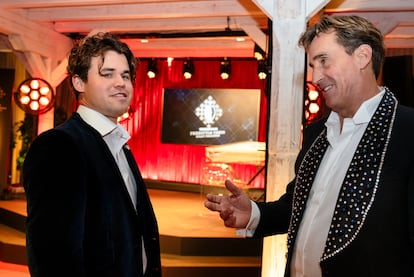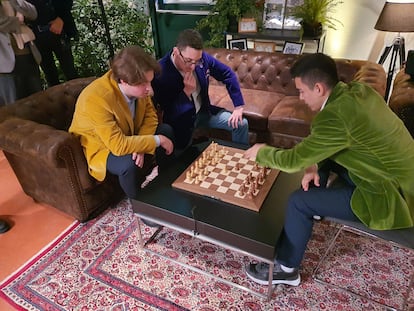The Carlsen-led chess revolution will have its own circuit on four continents
Buettner, the sponsor, predicts that the 960 (or freestyle) mode will coexist with the classic version, and he does not rule out the possibility of two parallel World Championships


There are indications that Philip II sponsored large tournaments in the 16th century because chess was highly valued in his court. Almost 500 years later, German Jan Henric Buettner is, for the moment, a patron of the arts who has invested €2 million in revolutionizing the mental sport as an “exciting challenge.” But he claims that 120 million people have already been impacted by the tournament in which eight stars are competing at his luxury resort Weissenhaus on the Baltic coast (he expected only 20 people). And he hopes to recoup the money when he adds the U.S., India and South Africa to the 960 (or freestyle, as he calls it) tournaments, which require deep thinking from the opening move because the position of the pieces is drawn minutes before each game. The number one player, Norwegian Magnus Carlsen, supports it unequivocally. This Thursday and Friday he faces the American Fabiano Caruana in the final.
In a 45-minute conversation with EL PAÍS, it becomes clear that Buettner, 60, is strongly guided by intuition. He was a pioneer of cell phones and the internet when they still seemed like science fiction; he made his fortune that way. In 2005 he bought the abandoned 75-hectare village of Weissenhaus in the tiny municipality of Wangels without knowing what he was going to do with it. Then he invested over 100 million in renovating it, and today it is one of Europe’s most luxurious resorts.
Then his wife convinced him to slow down and live a more relaxed life. One day, at home in South Africa, he decided he had to learn something. He thought of studying Italian, or music, but suddenly he remembered chess, which he played at school when he was 10, and his intuition told him to go for it. After some lessons with the German grandmaster Niclas Huschenbeth, Buettner decided to organize a big tournament with Carlsen’s essential presence. Buettner met Carlsen during a tournament in Qatar after convincing his father, Henrik, after a seven-hour chat.
The Norwegian said yes, but there was a radical change of direction: instead of classic chess, it would be the 960 version, which renders useless the tons of articles, books, videos and DVDs on the theory of openings and defenses. Like many chess players — although it is not clear that they represent the majority — Carlsen is fed up with the fact that the first twenty or more moves are done from memory, the result of home preparation with very powerful computers. He wants to enhance chess’s artistic and sporting side, forcing players to use their own minds from the first minute on.
That happened at the end of October. Within three months, Buettner set up a revolutionary tournament at the super-luxury Weissenhaus, with innovations that he and Carlsen agreed on: “My passion was born then, not so much for chess but for being able to do this tournament well, being a perfectionist about every detail,” the event sponsor recalls. Like Formula 1 drivers, each chess player has his own dressing room. After drawing the day’s starting position, the eight participants have only ten minutes (instead of the two hours they’ve had in the previous 960 tournaments) to think about what they’ll do before starting the match.
That applies a Scandinavian idea that brings a lot to the spectators (in person or online) and excites Buettner: “Those who are going to play the white pieces gather in front of one board, and those who will lead the black pieces on another, separated by a partition, and they discuss together the best opening strategy and the strengths and weaknesses of the starting position. I think this novelty is proving to be one of the tournament’s most interesting aspects because it allows us to see the best players in the world, their creative and thought process up close, a meter away.”

The “confessional” is much the same idea: when it is their opponent’s turn to move, the players voluntarily go into a small room and tell the camera how they feel, who has the advantage in the position and why. Certainly, knowing how a grandmaster thinks is a great gift for the fans who follow the match streams on the internet while listening to the commentators, Hungarian Peter Leko and Indian Tania Sachdev.
Buettner and Carlsen both closely follow the philosopher Socrates’ maxim: “I only know that I know nothing.” They often highlight how much they still have left to learn. From living with eight mental sport stars, the German patron of the arts learned that “chess players who seem very introverted can be very funny and interesting people, and they are eager to communicate and exchange ideas, they’re more flexible than we think.”
He has also become aware that chess, which teaches one how to think, is very useful in a world that changes rapidly, where schoolteachers “today do not really know what to teach that will be useful in ten years.” But his entrepreneurial mind turns to pragmatism: “I must concentrate on very concrete objectives, without spreading myself too thin. And the main [goal] is to convince new fans all over the world that freestyle chess saves them from having to spend a lot of hours studying openings and defenses. Hence the circuit I plan to have played in strategic countries on four continents.”
But he admits that he is going to face a very tough obstacle: a considerable percentage — there is no data to say the proportion at the moment, but it is certainly high — of the estimated 700 million fans vehemently oppose the 960 mode. They have invested years in studying openings and defenses, and they feel mentally naked if they are deprived of that vast knowledge. Buettner is practical about it: “Both modalities will coexist for a transitional period of ten, twenty or thirty years, like classic volleyball and beach volleyball, or Formula 1 and rallying; in the latter case, if you are a good driver you can succeed in both fields, and that goes for chess as well. The FIDE [International Chess Federation] suggested to me that Weissenhaus be the simultaneous venue for the classic and 960 World Championships at the end of this year. I am thinking about it.”
It has been deduced from several historical documents that Philip II gathered the best chess players of the time, Spanish and Italian, at his court in the mid-sixteenth century. As a result, he went down in history as the organizer of the first unofficial World Championship. Buettner says he doesn’t care what they say about him when he is dead: “But I am very encouraged to see that my 100-year-old great-grandmother wants to learn to play chess after watching streams of my tournament on the internet. I remember that tennis and golf succeeded as mass professional sports when the players’ associations [ATP and PGA, respectively] became strong. At the moment, Carlsen is my best ally, and I amplify his ideas. His father, Henrik, and I are dreaming that we will celebrate the great success of freestyle chess together in twenty years.”
Sign up for our weekly newsletter to get more English-language news coverage from EL PAÍS USA Edition
Tu suscripción se está usando en otro dispositivo
¿Quieres añadir otro usuario a tu suscripción?
Si continúas leyendo en este dispositivo, no se podrá leer en el otro.
FlechaTu suscripción se está usando en otro dispositivo y solo puedes acceder a EL PAÍS desde un dispositivo a la vez.
Si quieres compartir tu cuenta, cambia tu suscripción a la modalidad Premium, así podrás añadir otro usuario. Cada uno accederá con su propia cuenta de email, lo que os permitirá personalizar vuestra experiencia en EL PAÍS.
¿Tienes una suscripción de empresa? Accede aquí para contratar más cuentas.
En el caso de no saber quién está usando tu cuenta, te recomendamos cambiar tu contraseña aquí.
Si decides continuar compartiendo tu cuenta, este mensaje se mostrará en tu dispositivo y en el de la otra persona que está usando tu cuenta de forma indefinida, afectando a tu experiencia de lectura. Puedes consultar aquí los términos y condiciones de la suscripción digital.








































